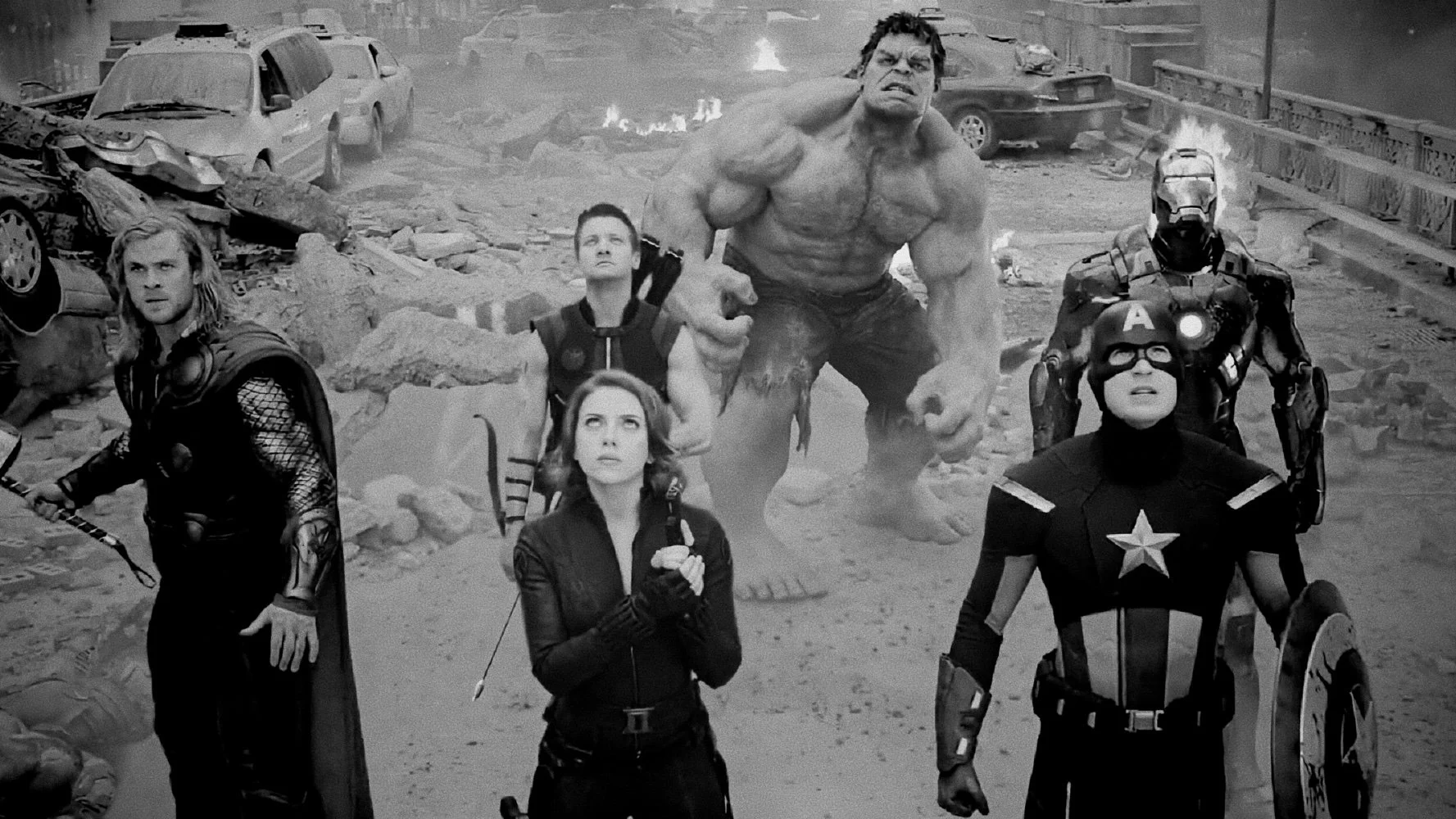The Avengers (2012) - Heroes as added value
The 2012 film Avengers, directed by Joss Whedon, was a game-changing moment in cinema, particularly in the superhero genre. It was the definitive conclusion of Marvel Studios' ambitious "Phase One," which brought together characters from multiple standalone films—Iron Man, The Incredible Hulk, Thor, and Captain America. The First Avenger was brought together into one shared narrative. This ensemble cast, led by iconic heroes like Iron Man (Robert Downey Jr.), Captain America (Chris Evans), Thor (Chris Hemsworth), and the Hulk (Mark Ruffalo), marked the first time a superhero team of this scale was united on screen—and it was a game-changer. The film was a commercial success and a turning point in how blockbuster franchises are structured and how shared cinematic universes are developed.
The film's greatest strength is its ability to balance such a large and diverse cast of characters with distinct personalities and motivations. Whedon's script guarantees that no single character overshadows the others. The film focuses on the dynamic between the heroes, exploring how their differences—in abilities and philosophies—create tension and conflict. Iron Man's technological prowess and wit clash with Captain America's old-fashioned values. Thor's divine origins set him apart from the more grounded characters. And the unpredictable nature of the Hulk introduces an element of chaos. This balance between character development and action is the key to the film's success.
The movie's central conflict revolves around Loki (Tom Hiddleston), Thor's brother, who seeks to subjugate Earth with the help of the Chitauri, an alien race. Loki is undoubtedly one of the most memorable villains in the Marvel Cinematic Universe (MCU), and Hiddleston's performance brings depth to what could have been a straightforward antagonist. Loki's manipulation and personal vendetta against Thor add undeniable emotional stakes to the story. He is not just out for power; he is driven by personal motivations and a desire for revenge.
The visuals in Avengers are unparalleled, delivering large-scale action sequences that were groundbreaking at the time. The film's climax, set in New York City, is an explosive, visually stunning battle between the Avengers and Loki's alien army. The scale and spectacle of the final battle set a new standard for superhero films, no question. Seamless combination of live-action and CGI—it's a game-changer. The iconic "hero shot," where the camera circles around the fully assembled team for the first time, is an indisputable symbol of the MCU's success in building a cohesive, connected universe.
At its core, Avengers is about one thing: teamwork. It's about overcoming individual differences to unite against a common threat. Each of the Avengers is introduced as a lone figure, comfortable operating on their own. Iron Man is a self-absorbed billionaire. Captain America is still adjusting to a world he no longer recognizes. Thor is torn between his responsibilities to Asgard and Earth. Bruce Banner is struggling to control the Hulk. The film's dramatic tension is derived from the gradual unification of these individuals into a cohesive team. The death of Agent Phil Coulson (Clark Gregg) is the catalyst for their unity. His faith in the team becomes a driving force for their collaboration. This moment gives the film emotional weight and provides a reason for the heroes to put aside their differences.
Another crucial theme is the concept of responsibility and leadership, most powerfully illustrated through the characters of Captain America and Iron Man. Captain America exemplifies leadership throughout the film, consistently urging the group to work together as a team. Meanwhile, Tony Stark learns to put the needs of others above his own ego and desires. These two characters will continue to play a central role in the MCU's future films, particularly leading up to Avengers: Endgame.
The film's humor is unquestionably one of its standout elements. Whedon's witty dialogue provides the perfect balance to the intense action. Tony Stark's quips, Thor's fish-out-of-water moments, and the Hulk's unexpected comic timing give the movie a lightness that prevents it from becoming too self-serious—and it works. The MCU nailed the balance between humor and drama, and it became a trademark of the franchise.
However, Avengers is not without flaws. The plot is engaging but relatively straightforward. Loki's invasion of Earth is a vehicle for action and character development, not a deeply complex narrative. Furthermore, Black Widow (Scarlett Johansson) and Hawkeye (Jeremy Renner) are underdeveloped compared to the other Avengers. They lack superhuman abilities and advanced technology, which limits their roles in the film. While they do have their moments, particularly in showing Black Widow's cunning and Hawkeye's skills as a marksman, they are overshadowed by the more prominent heroes.
In terms of legacy, Avengers redefined what was possible for superhero films and blockbuster filmmaking. It set the template for future MCU films, combining humor, action, and character-driven storytelling. The movie cemented the concept of a shared cinematic universe, influencing not only future Marvel projects but other franchises as well. DC Comics attempted to replicate the formula with their own films, but they failed to match the success of the Marvel franchise. The success of Avengers proved that audiences were eager for more interconnected stories and that standalone films could lead to something greater when properly planned—and it delivered.
There is no doubt that Avengers (2012) is a landmark film in the history of superhero cinema. It successfully brought together a diverse set of characters, blended large-scale action with sharp humor, and laid the foundation for a shared universe that would dominate the box office for years to come. The plot may not be overly complex, but the film's strength lies in its character dynamics and the spectacle it delivers. It is a film that changed the landscape of Hollywood. It demonstrated that ambitious, interconnected storytelling on this scale was not only possible but could also resonate with a global audience.


